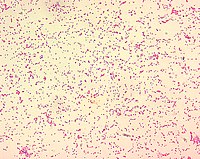
Photo from wikipedia
Cattle, buffalo, and porcine materials are widely adulterated, and their quantification might safeguard health, religious, economic, and social sanctity. Recently, conventional polymerase chain reaction (PCR) and PCR-restriction fragment length polymorphism… Click to show full abstract
Cattle, buffalo, and porcine materials are widely adulterated, and their quantification might safeguard health, religious, economic, and social sanctity. Recently, conventional polymerase chain reaction (PCR) and PCR-restriction fragment length polymorphism (RFLP) assays have been documented but they are just suitable for identification, cannot quantify adulterations. We described here a quantitative tetraplex real-time PCR assay with TaqMan Probes to quantify contributions from cattle, buffalo, and porcine materials simultaneously. Amplicon-sizes were very short (106-, 90-, and 146-bp for cattle, buffalo, and porcine) because longer targets could be broken down, bringing serious ambiguity in molecular diagnostics. False negative detection was eliminated through an endogenous control (141-bp site of eukaryotic 18S rRNA). Analysis of 27 frankfurters and 27 meatballs reflected 84-115% target recovery at 0.1-10% adulterations. Finally, a test of 36 commercial products revealed 71% beef frankfurters, 100% meatballs, and 85% burgers contained buffalo adulteration, but no porcine was found in beef products.
Journal Title: Journal of agricultural and food chemistry
Year Published: 2017
Link to full text (if available)
Share on Social Media: Sign Up to like & get
recommendations!